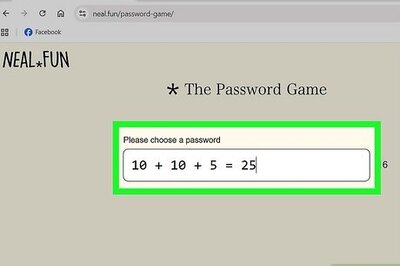
views
Paying Attention to the Signs

Notice if your partner spends less time with you. Your partner may develop sudden new interests or friends if they are cheating. They may begin working longer hours. If you ask your partner where they are going, your partner may give you a vague answer such as "Out." or "Meeting up with some people." When you try to contact your partner when they are out, your partner may send your call to voicemail or not return your text messages. Your partner may frequently say, "I didn't hear the phone." or "Sorry, my battery died." Note whether this is a consistent pattern, or whether it lasts only a short time. Your partner may well have a project at work taking up more of their time. However, they should feel comfortable telling you that this is what's happening. If not, this could be a sign that your partner is cheating.

Notice if your partner has become more secretive. Your partner may begin to leave the room to talk on the phone or never leave the phone behind when they leave the room. If your partner is on the computer, they may shut down the computer when you walk by or enter the room. Your partner may be becoming secretive because they feel the need to hide things from you. Make sure the secretiveness is something new. If your partner has always been private, it may be more difficult for you to notice anything. If you ask your partner who was on the phone or what they were doing on the computer, your partner may respond by saying, "No one," or "It's work related." or "Wrong number." or "Why are you asking?"

Notice if you and your partner are arguing more. A person may feel guilty or more irritable when they having an affair. Keeping a secret can take a toll on a person. To deal with their feelings, a cheating partner may start fights with you, criticize you, or even accuse you of cheating. A cheating partner will try to make you feel bad about yourself or that you have done something wrong. During arguments, your partner may try to make it seem like you are the problem in the relationship instead of them. Remember that your partner is acting this way because of the lie that they are living. You should not feel guilty about anything.

Recognize changes in your physical relationship. Your partner may become less affectionate when they are having an affair and pull away from you if you try to show affection. Your partner may not initiate sex or feel distant even when you do make love. Your partner may no longer greet you with a hug or a kiss or may not be interested in holding hands. An increase in your partner's sex drive or an interest in trying different sexual things may also be a clue. If you tell your partner that you have noticed a difference, they will probably deny it or suggest that you are being sensitive or unreasonable.

Notice if your partner puts more effort into their physical appearance. Has your partner started going to the gym more or changing their diet? Has your partner gone shopping for new a wardrobe or began wearing different cologne or perfume? Your partner may also buy new clothes but never wear them around you. They are probably trying to look good for someone else. Notice if your partner smells differently when they come home as well.

Check their phone. Check the phone when your partner is sleeping or in the shower. You do not want to get caught snooping. Look through the call log and text messages for names or number that you are not familiar with. If your partner is smart, they may delete text messages and clear their call log. You can also check email, Facebook, or Twitter. See if there has been any contact with new people. If you have access to their computer, check the web browsing history as well. Check their phone for dating apps (e.g., Tinder, OkCupid, Plenty of Fish, etc.) as well. These could be used to meet other people. If your partner deletes their call log, you can get call records from the phone carrier. Going through your partner's phone is an invasion of privacy. If your partner is not cheating, they may feel betrayed by your lack of trust.

Recognize a lack of interest in the relationship. A cheating partner often stops putting effort into the relationship. They may no longer take interest in your life or feelings. Your partner stops offering you emotional support. For example, you may tell your partner about an issue that you are having at work or at school, and they may tell you it's not a big deal. Your partner may not be interested in discussing the future of the relationship or making future plans.

Trust your gut. If your intuition is telling you that something is off in your relationship, listen. Science has shown that people can tell if their partner is cheating. You should not rely on your gut alone. However, if you have a feeling, begin paying attention to any other signs that your partner may be cheating.
Gathering the Evidence

Hire a Private Investigator (PI). Private investigators are expensive but are almost a sure way to catch a cheating partner. The private investigator has many tools available that you will not. Tell your PI exactly what you need and discuss the costs of services before you hire them. PIs can be found by searching Google or the Yellow Pages, or by getting a referral from a friend or the local police department. Find a PI that is licensed with your state. Speak with a few PIs before you make your choice. You want someone who is experienced and has a good reviews. Hire an investigator that specializes in infidelity investigations.

Try using a keylogger. Keyloggers are devices that are used to monitor the keystrokes on a computer. These devices will allow you to see all the keystrokes made on the computer, passwords, and all of the websites that have been visited.The two types of keyloggers are hardware keyloggers and software keyloggers. Hardware keyloggers work for desktops and laptops with an external keyboard. These devices are plugged into the back of the computer. Check to see if the computer has a USB socket or a PS/2 Socket and then buy the appropriate keylogger. You can get a keylogger with 2GB of storage space for about $10. If you plan on checking the data daily, this should be sufficient. Additional storage space will cost more money. These devices will be visible to your partner if they are observant. Software keyloggers have the ability to save passwords, save and log instant messenger conversations, and take screenshots at set times. More advanced software keyloggers can email you information as well. Software keyloggers can be purchased online. Be prepared to pay at least $40. Be careful with free keylogger downloads. Most of this software is not free and is actually used to monitor your keystrokes.

Use cell phone spying software. The software must be downloaded on your partner's phone. You will need to physically have the phone for 5 to 10 minutes.These apps will not be visible to your partner once they are downloaded. The software will allow you to see your partner's text messages, emails sent to and from the phone, web browsing history, phone contacts, and where the phone is using Google Maps.r This software can cost anywhere between $70 and $300, but it is a good investment. If your partner's phone is locked, you will need the pass code. Keep in mind that spying on someone's cell phone is illegal in some states. Check your local laws before you do this.

Follow your partner. If you suspect that your partner is going to meet up with someone else or is lying about their whereabouts, you can discreetly follow your partner. Keep a safe distance from your partner's car when you are driving and parking. You may want to drive someone else's car if possible. Do not wear any ridiculous disguises. You do not want to draw any attention to yourself. Take binoculars with you so you can see what your partner is doing from far away. Use the mirrors of your car to watch your partner instead of staring directly at them.

Plan a surprise visit. Go to your partner's job or home unannounced. You can pretend like you just wanted to bring them some food or a gift. If you live together, tell your partner that you are working late and then come home early. This may help you catch your partner in a lie.

Keep a journal of your partner's activities. Document any methods that you are using to spy on your partner, any changes in behavior, conversations between the two of you, any and any lies or excuses. This will help you piece everything together and can come in handy when you confront your partner. Your partner may try to change their story or confuse you.
Dealing with the Aftermath

Present your proof. It is difficult to approach your partner without concrete evidence that they have been cheating. Your evidence may include emails or text messages. If you bring the evidence to your partner, do not let them try to convince you that you are crazy.

Write down your feelings. You probably have a lot of emotions running through your mind. Write down exactly how you are feeling and thinking. There is no right or wrong way to feel about your partner cheating. Do not hold anything back. Do not go back and read what you wrote. Burn the letter when you are finished writing. This exercise will allow you to get all of your feelings out in a safe way.

Determine your next move. Decide if you are willing to continue the relationship, or if you want to end things. You may need to talk to your partner first before you can decide which direction you want to move in. Reader Poll: We asked 406 wikiHow readers, and 68% said that if they found out that their partner was cheating, they’d choose to end the relationship. [Take Poll]

Set aside a time to talk with your partner. Write down all of the questions that you would like your partner to answer. Find a time that works for both of you where there will be no interruptions. Choose a space where you are comfortable and safe in case things get heated. Set a time limit for the conversation. Two hours is a reasonable amount of time to start with. This conversation should begin when you are ready. Do not rush or force yourself to discuss this with your partner unless you want to. You will most likely need to have multiple conversations. One meeting may not be enough.

















Comments
0 comment